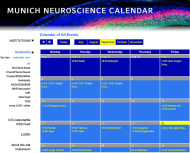German Center for Vertigo and Balance Disorders (DSGZ)
Director: Prof. Dr. med. Andreas Zwergal
The  German Center for Vertigo and Balance Disorders (DSGZ) is an integrated research and treatment center for dizziness, balance, and eye movement disorders.
German Center for Vertigo and Balance Disorders (DSGZ) is an integrated research and treatment center for dizziness, balance, and eye movement disorders.
The DSGZ was established in 2009 with funding from the Federal Ministry of Education and Research (BMBF) as part of the IFB program. This funding aimed to establish innovative research and treatment centers at medical faculties and university hospitals, where cutting-edge clinical research in specific disease areas is promoted through an integrated collaboration of clinical research and patient care at the highest level, ensuring the effective transfer of research results into healthcare.

Due to the successful implementation of these criteria, the German Center for Vertigo and Balance Disorders (DSGZ) has been extended by the Federal Ministry of Education and Research (BMBF) for a further five years after the initial funding period, until fall 2019. During this time, it has developed into one of the leading clinical and scientific institutions in this field internationally.
The interdisciplinary outpatient clinic represents the core module of the German Center for Vertigo and Balance Disorders and has become the national reference institution for patients with dizziness, balance, and eye movement disorders. More than 3,000 selected patients from Germany and abroad are seen and treated here annually. The integrated care network ensures the continued treatment of patients with dizziness.
Since November 1, 2019, the German Center for Vertigo and Balance Disorders has been an independent interdisciplinary center at the LMU Munich Hospital. The DSGZ's three parent departments are the Department of Neurology, the Department of Otorhinolaryngology, and the Institute of Diagnostic and Interventional Neuroradiology. Furthermore, close ties exist with cooperating basic science institutions and clinics locally through mutual collaboration and rotation, as well as internationally within the European DIZZYNet network.
 The DSGZ's translational research activities, from basic sciences to clinical practice, encompass the investigation of questions relating to pathophysiology, diagnostics, and therapy and are further promoted by the permanent establishment of three W2 professorships and two junior research groups.
The DSGZ's translational research activities, from basic sciences to clinical practice, encompass the investigation of questions relating to pathophysiology, diagnostics, and therapy and are further promoted by the permanent establishment of three W2 professorships and two junior research groups.
(translation, source: https://www.lmu-klinikum.de/schwindelzentrum/uber-uns/13fa73123bc78bbc)


